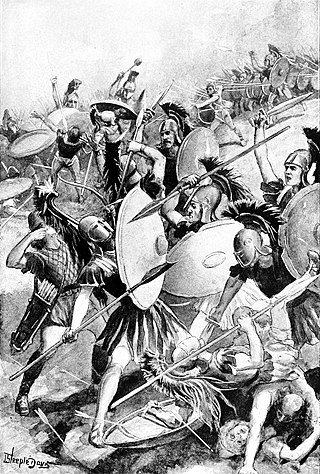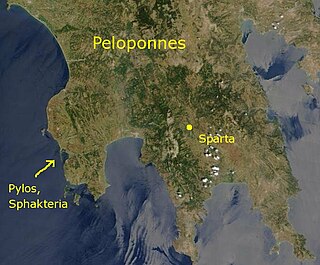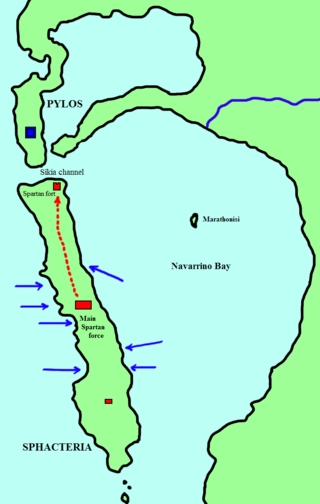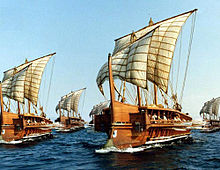
The Peloponnesian War was an ancient Greek war fought between Athens and Sparta and their respective allies for the hegemony of the Greek world. The war remained undecided for a long time, until the decisive intervention of the Persian Empire in support of Sparta. Led by Lysander, the Spartan fleet, built with Persian subsidies, finally defeated Athens and started a period of Spartan hegemony over Greece.

Conon was an Athenian general at the end of the Peloponnesian War, who led the Athenian naval forces when they were defeated by a Peloponnesian fleet in the crucial Battle of Aegospotami; later he contributed significantly to the restoration of Athens' political and military power.
The Battle of Aegospotami was a naval confrontation that took place in 405 BC and was the last major battle of the Peloponnesian War. In the battle, a Spartan fleet under Lysander destroyed the Athenian navy. This effectively ended the war, since Athens could not import grain or communicate with its empire without control of the sea.
The Battle of Cyzicus took place in May or June 410 BC during the Peloponnesian War. During the battle, an Athenian fleet commanded by Alcibiades, Thrasybulus, and Theramenes routed and destroyed a Spartan fleet commanded by Mindarus. The victory allowed Athens to recover control over a number of cities in the Hellespont over the next year. In the wake of their defeat, the Spartans made a peace offer, which the Athenians rejected.

The Sicilian Expedition was an Athenian military expedition to Sicily, which took place from 415–413 BC during the Peloponnesian War between Athens on one side and Sparta, Syracuse and Corinth on the other. The expedition ended in a devastating defeat for the Athenian forces, severely impacting Athens.

The Battle of Naupactus was a naval battle in the Peloponnesian War. The battle, which took place a week after the Athenian victory at Rhium, set an Athenian fleet of twenty ships, commanded by Phormio, against a Peloponnesian fleet of seventy-seven ships, commanded by Cnemus.

The naval Battle of Pylos took place in 425 BC during the Peloponnesian War at the peninsula of Pylos, on the present-day Bay of Navarino in Messenia, and was an Athenian victory over Sparta. An Athenian fleet had been driven ashore at Pylos by a storm, and, at the instigation of Demosthenes, the Athenian soldiers fortified the peninsula, and a small force was left there when the fleet departed again. The establishment of an Athenian garrison in Spartan territory frightened the Spartan leadership, and the Spartan army, which had been ravaging Attica under the command of Agis, ended their expedition and marched home, while the Spartan fleet at Corcyra sailed to Pylos.

The Battle of Sphacteria was a land battle of the Peloponnesian War, fought in 425 BC between Athens and Sparta. Following the Battle of Pylos and subsequent peace negotiations, which failed, a number of Spartans were stranded on the island of Sphacteria. An Athenian force under Cleon and Demosthenes attacked and forced them to surrender.
The naval Battle of Cynossema took place in 411 BC during the Second Peloponnesian War. In the battle, an Athenian fleet commanded by Thrasybulus and Thrasyllus, although initially thrown on the defensive by a numerically superior Spartan fleet, won a narrow victory. This victory had an impact out of proportion to its tactical significance, coming when Athens' traditional democratic government had been replaced by an oligarchy and an Athenian defeat could have ended the war. The newly confident Athenian fleet proceeded to win two more victories in the Hellespont in quick succession, the second being the dramatic rout at Cyzicus, which ended the immediate Spartan threat to Athens' Black Sea lifeline.
The Battle of Arginusae took place in 406 BC during the Peloponnesian War near the city of Canae in the Arginusae Islands, east of the island of Lesbos. In the battle, an Athenian fleet commanded by eight strategoi defeated a Spartan fleet under Callicratidas. The battle was precipitated by a Spartan victory, which led to the Athenian fleet under Conon being blockaded at Mytilene. To relieve Conon, the Athenians assembled a scratch force composed largely of newly-constructed ships manned by inexperienced crews. The inexperienced fleet was thus tactically inferior to the Spartans, but its commanders circumvented the problem by employing new and unorthodox tactics, which allowed the Athenians to secure a dramatic and unexpected victory. Slaves and metics who participated in the battle may have been granted Athenian citizenship.
The Battle of Notium in 406 BC was a Spartan naval victory in the Peloponnesian War. Prior to the battle, the Athenian commander, Alcibiades, left his helmsman, Antiochus, in command of the Athenian fleet, which was blockading the Spartan fleet in Ephesus. In violation of his orders, Antiochus attempted to draw the Spartans into battle by tempting them with a small decoy force. His strategy backfired, and the Spartans under Lysander scored a small but symbolically significant victory over the Athenian fleet. This victory resulted in the downfall of Alcibiades, and established Lysander as a commander who could defeat the Athenians at sea.
The Battle of Abydos was an Athenian naval victory in the Peloponnesian War. In the battle, the Spartan fleet, under Mindarus, attempted to rescue a small allied fleet that had been driven ashore at Dardanus, but was attacked by the Athenian fleet, under Thrasybulus. The fighting was evenly contested for a great length of time, but towards evening, the arrival of Alcibiades with Athenian reinforcements tipped the balance in favor of the Athenians, and the Peloponnesians were forced to flee back to their base at Abydos, suffering heavy losses along the way.

Demosthenes, son of Alcisthenes, was an Athenian general during the Peloponnesian War.
The Battle of Mytilene was a battle fought in 406 BC between Athens and Sparta. The Spartans were victorious.
Thrasyllus was an Athenian strategos (general) and statesman who rose to prominence in the later years of the Peloponnesian War. First appearing in Athenian politics in 410 BC, in the wake of the Athenian coup of 411 BC, he played a role in organizing democratic resistance in an Athenian fleet at Samos. There, he was elected strategos by the sailors and soldiers of the fleet, and held the position until he was controversially executed several years later after the Battle of Arginusae.

The Samian War was an Ancient Greek military conflict between Athens and Samos. The war was initiated by Athens's intervention in a dispute between Samos and Miletus. When the Samians refused to break off their attacks on Miletus as ordered, the Athenians easily drove out the oligarchic government of Samos and installed a garrison in the city, but the oligarchs soon returned, with Persian support.
The First Peloponnesian War was fought between Sparta as the leaders of the Peloponnesian League and Sparta's other allies, most notably Thebes, and the Delian League led by Athens with support from Argos. This war consisted of a series of conflicts and minor wars, such as the Second Sacred War. There were several causes for the war including the building of the Athenian long walls, Megara's defection and the envy and concern felt by Sparta at the growth of the Athenian Empire.
The Battle of Rhium or the battle of Chalcis was a naval battle in the Peloponnesian War between an Athenian fleet commanded by Phormio and a Peloponnesian fleet composed of contingents from various states, each with its own commander. The battle came about when the Peloponnesian fleet, numbering 47 triremes, attempted to cross over to the northern shore of the Gulf of Patras to attack Acarnania in support of an offensive in northwestern Greece; Phormio's fleet attacked the Peloponnesians while they were making the crossing.
The Mytilenean revolt was an incident in the Peloponnesian War in which the city of Mytilene attempted to unify the island of Lesbos under its control and revolt from the Athenian Empire. In 428 BC, the Mytilenean government planned a rebellion in concert with Sparta, Boeotia, and certain other cities on the island, and began preparing to revolt by fortifying the city and laying in supplies for a prolonged war. These preparations were interrupted by the Athenian fleet, which had been notified of the plot, and the Mytileneans sent representatives to Athens to discuss a settlement, but simultaneously dispatched a secret embassy to Sparta to request support.

Cnemus was the Spartan fleet commander during the second and third years of the Archidamian War. During his command, Cnemus oversaw a series of operations that met with failure. As a result, the Spartans began to question Cnemus' leadership and sent several advisers to assist him in his command.








